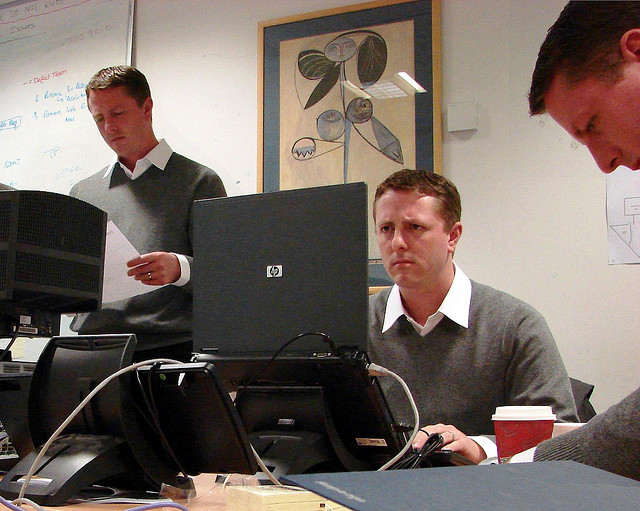“Put ‘reasonable’ back in reasonable overtime”
September 11 Many young people graduating from tertiary studies are keen to work hard in their first place of employment, even to the point of working too hard or for too long. However as McKell Institute Research Fellow Christopher Angus articulates, this ‘vicious circle’ could have serious long-term impacts for not just the individual, but society as a whole.
Many young people graduating from tertiary studies are keen to work hard in their first place of employment, even to the point of working too hard or for too long. However as McKell Institute Research Fellow Christopher Angus articulates, this ‘vicious circle’ could have serious long-term impacts for not just the individual, but society as a whole.
In 2014 thousands of graduating students in Australia will commence careers in law, finance, health, engineering and a host of other industries. If you asked them how many hours they should be working each week, they’ll probably guess 38 hours – the maximum time permitted under Australia’s National Employment Standards (NES).
However, for many of next year’s cohort—and a large proportion of full-time Australian workers—this ‘maximum’ is routinely ignored, or exploited well beyond anything the average person would deem ‘reasonable’.
Several studies, including the Australian Bureau of Statistics and the OECD’s Better Life Index, have concluded that nearly one in five Australian employees work more than 50 hours each week – one of the developed world’s worst performers.
According to a survey by the Australian Council of Trade Unions, over 60 per cent of respondents regularly worked longer than what was stipulated in their employment contracts, and nearly half did not receive any compensation for their work, which the ACTU estimated was valued at $72bn.
How are so many businesses allowed to keep their workforce back on a regular basis?
Simple – a contractual clause called ‘reasonable overtime’, which allows business to request their employees to stay on longer to complete work in times of need.
What is ‘reasonable’ isn’t defined, and ultimately depends on the type of industry. For example, staying back an extra hour might be reasonable in a restaurant on a busy evening, but pulling an all-nighter might be acceptable in a law firm when a big court case is underway.
Reasonable overtime is not an inherently bad concept. Most businesses have deadlines to meet or face exceptional circumstances at work, and the occasional long shift in the office or unusual hours is a normal part of working life.
However, regularly working an extra day and a half each week isn’t reasonable, and a substantial proportion of Australians share this view.
In 2012 the Centre for Work + Life found that, on average, Australian workers want to work 3.4 hours less each week than they currently do. For those working 12 hour days or longer, this figure is likely to be even higher.
Under Australia’s Fair Work Act, employees can refuse to work overtime, especially if doing so would affect our family lives or health.
However, most don’t take advantage of this law – sadly, in an age of increasingly insecure work, a person’s fear for their career trumps concerns for their personal wellbeing.
Recent research has found that many workers believe they must work long hours in order to succeed in their careers. Put bluntly, they’re scared that if they don’t work weekends they’ll be fired.
This state of affairs is particularly bad for new graduates, who often commence their working lives on probationary contracts. In highly competitive industries, or companies whose profit margins are vulnerable to global events, new graduates might feel that there is no choice but to work long hours in order to remain at work.
Such beliefs are reinforced by a culture of workaholism within many companies and industries.
Many in management might be unsympathetic to graduates seeking a decent work-life balance. After all, many company leaders only got their jobs after months, or years, of ‘volunteering’ for obscene workloads, so the idea of free time to spend with friends or family may be completely alien to them.
Meanwhile, established staff—the mentors and supervisors of graduates—are often caught up in the rat race, working punishing hours to score a promotion or even just hold on to the jobs they already have.
Excited graduates with little knowledge of the industry, or their workplace rights, are highly susceptible to the behaviour of their peers, and risk burdening themselves with high workloads for no other reason than the fact that everyone else is working long hours.
It’s a vicious circle that research shows results in poor mental and physical health, higher levels of family conflict and childhood obesity, and, in an ironic twist, lower levels of career attainment and satisfaction.
New graduates should be aware of the risk of overwork, and be aware that the word ‘reasonable’ in many workplaces is now synonymous with ‘unpaid’, ‘unhealthy’, ‘unwanted’ and ‘unending’. They must be prepared to say ‘no’ to unreasonable overtime, and decide exactly how much of a priority their careers are in relation to their free time, friends and families.
Because if this new generation of workers won’t stand up for a reasonable work-life balance, they’re sending a clear message to their children: work equals life.
photo credit: Greg Marshall via photopin cc
…………………………………………………………………………………………………………………
Chris Angus is a Research Fellow at the McKell Institute in Australia. He is currently completing a Master of Laws (Juris Doctor) at Monash University and holds a Bachelor of Arts (Media and Communication) from Deakin University.
…………………………………………………………………………………………………………………
Opinions expressed in this article are those of the author and do not necessarily represent the views of the Commonwealth Youth Programme. Articles are published in a spirit of dialogue, respect and understanding. If you disagree, why not submit a response?
To learn more about becoming a Commonwealth Correspondent please visit: http://www.yourcommonwealth.org/submit-articles/commonwealthcorrespondents/
…………………………………………………………………………………………………………………




